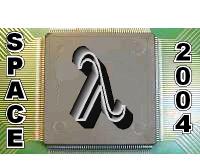Second workshop on
SEMANTICS, PROGRAM ANALYSIS,
AND COMPUTING ENVIRONMENTS
FOR MEMORY MANAGEMENT
January 12, 2004
Venice, Italy, January, 2004
|
Sponsored by ACM/SIGPLAN. In cooperation with EAPLS. |
|

|
Second workshop on
January 12, 2004
|

|
Memory management is a difficult engineering task. We desperately need new tools and analyses that can identify memory management errors in low-level C/C++ code, such as dereferencing a pointer to an object that has been recycled or failing to reclaim an object. We also need new data structures and algorithms to avoid overheads such as fragmentation and synchronization. High-level languages such as Java or ML insulate the programmer from many of these problems through automatic memory management techniques (e.g., garbage collection). But standard GC techniques are not always suitable for all domains. For instance, programmers for embedded and real-time systems need static guarantees about resource requirements that are difficult to meet with standard collection algorithms. New languages, logics, analyses, and type systems are needed that let us reason about the management of memory, time, and other critical resources. The aim of this workshop is to bring together researchers for a fruitful exchange of ideas on semantics, program analysis and computing environments for memory management.
SCOPE: Topics of interest include but are not limited to:
TIME AND PLACE: The workshop takes place Monday, January 12th, 2004 in Venice at the Ca' Dolfin Auditorium, University of Venice. It is co-located with POPL 2004, which takes place January 14-16, 2004.
FORMAT: The workshop will consist of:
The long papers will be selected by a program committee and only "lightly" reviewed. Our goal in selecting papers is to meet our time requirements and present a balanced program. We hope to include all of the short presentations, but may be forced to select a subset depending on the number of submissions. Again, our goal is to have a productive, interactive workshop.
At lunch-time, participants will be able to sign up for a "5-minute madness" talk slot (as time permits). These talks will be limited to at most 2 viewgraphs and are meant to give a brief, perhaps provocative, viewpoint on the research issues in memory management and to spark conversation. A moderator will limit time according to the excitement generated by the presentation.
INFORMAL PROCEEDINGS: We will distribute an informal proceedings at the workshop only. We do not consider the proceedings to be a formal (citable) publication so that any works in progress presented here may be submitted later for formal publication.
The informal proceedings for the workshop will consist of the accepted long papers, and titles and abstracts for the short presentations. Updated post-workshop proceedings will include the list the 5-minute madness talks presented.
INVITED SPEAKERS:
PROGRAM:
8:30 - 10:15
10:15 - 10:45 Coffee/tea break
10:45 - 12:30
12:30 - 14:00 Lunch
13:45 - 14:00 Sign-up for 5-minute madness presentations
14:00 - 15:45
15:45 - 16:15 Break
16:15 - 17:50
lfd_infer: An
Implementation of a Static Inference on Heap Space
Usage (short talk; pdf)17:50 - 18:00 Short break
18:00 - 19:00 5-minute madness talks
Waving one's hands about memory safety is unsatisfying because we have largely failed to give a compelling definition of memory safety. However, we have compelling definitions of encapsulation (i.e., ADTs), so we should argue that memory-management should preserve encapsulation. In particular, it must be possible for an abstraction to create and maintain private (i.e., encapsulated) space. At minimum, this requires that no usable aliases to freshly allocated space exist. Ensuring this is good motivation for what we do.
We all believe in our hearts that types are just a limited form of propositions - restricted to obtain decidability. But we are far from devising usable logics and type systems that make this evident. On the one hand, only propositions are rich enough to express program correctness, as opposed to safety properties. On the other, only types extend to higher-order. There is also a semantic problem: Types denote partial equivalence relations on the domain of values, but propositions only denote subsets. Where are the equivalences that propositions should denote?
19:00 - 20:00 Free time (Bar, hotel, etc.)
20:00 - 2X:00 Dinner
INFORMATION:
Please refer to the workshop home page at
http://www.diku.dk/topps/space2004/
or subscribe to the low-volume mailinglist at
http://mailman.itu.dk/mailman/listinfo/space (which is exclusively dedicated
to SPACE) for up-to-date information on location, invited talks,
participation, etc.
REGISTRATION: For information on registration, accommodations etc, please refer to the POPL 2004 conference web pages.
GENERAL CHAIRS:
PROGRAM COMMITTEE:
| Updated $Id: cfp.html,v 1.19 2004/02/06 14:41:12 hniss Exp $ |